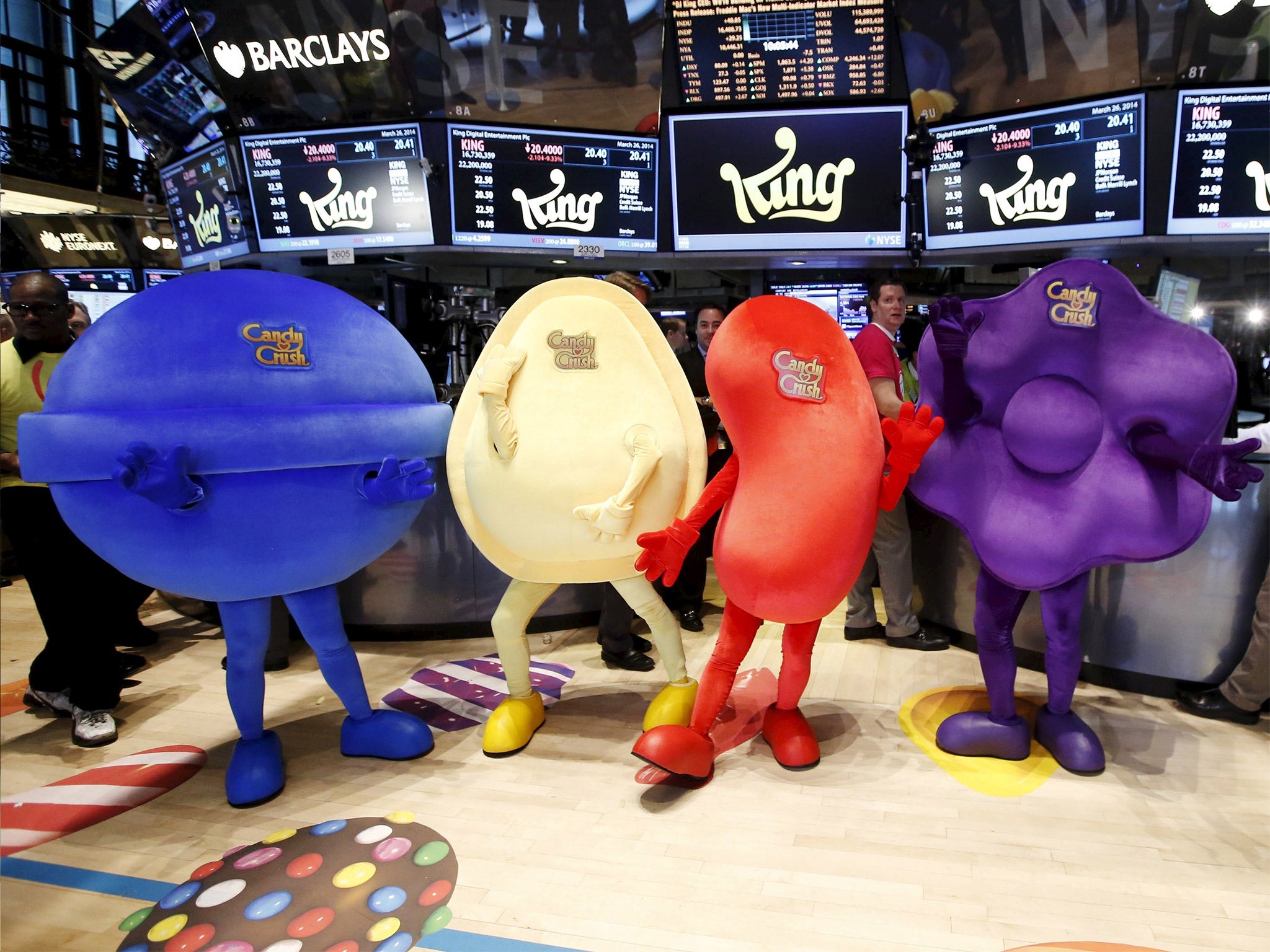King Digital: Why a US gaming giant spent $5.9bn on a mobile one-hit wonder
The UK remains a hotbed of dynamic tech start-ups, but the big game hunters keep gobbling them up

Candy Crush’s stock market saga turned out to be a short-lived affair.
London-based King Digital, the company behind the mobile puzzle game, is being bought by Activision Blizzard, the US maker of Call of Duty and Guitar Hero, in a deal worth up to $5.9bn (£3.8bn).
The sale comes just 18 months on from King’s much-maligned IPO when it was valued at a steep $7bn – throwing in the towel so early effectively confirms the suspicion that the business was overpriced when it floated on Nasdaq.
On the surface, the rationale for the deal from Activision’s perspective is obvious. It is snapping up a mobile gaming group to offset the downturn in the games consoles market, which it specialises in.
Jonathan Buxton, partner at Cavendish Corporate Finance, reckons the acquisition is testament to “where the gaming industry is heading over the next few years”.
He said: “With the console market undergoing a marked decline while mobile gaming is expected to grow by another 50 per cent by 2019, uniting these houses under one roof can help monetise the mobile ecosystem and capture the increasing amount of time that consumers are spending on non-console/PC platforms.”
However, King has been battling falling sales and profits this year with the popularity of Candy Crush Saga, its confectionary-based app which still makes up more than a third of revenues, on the wane.
When King listed in March last year, the big question was whether it could replicate the success of Candy Crush. At the time, it boasted of having a long list of games – 180 to be precise – which it believed would give it a good chance of succeeding.
But the company has admitted that over the last two quarters, the fall in popularity of Candy Crush Saga was only “partially offset” by increased revenues from new games such as Candy Crush Soda Saga. Other new franchises such as Farm Heroes and Bubble Witch have proved popular but have failed to rake in the revenues in the same way Candy Crush’s in-app purchases did.
Earlier this year, analysts at Credit Suisse claimed three out of five new game launches would be flops – so low are the barriers to entry in mobile games.
Investors bemoaned the fact that King, seen as one of the success stories of the London tech scene, even though it was founded in Sweden, chose to float in New York and not in its home.
Wall Street is still the mecca for founders of tech companies hoping to cash in on their business’s rise to the top. Many argue London does not have enough analysts who “get” tech companies, compared with across the pond where there are whole teams of people crunching the numbers.
But George O’Connor, Panmure Gordon’s technology analyst, argues that investors here “dodged a bullet” with King.
“Like all games authoring companies you can get struck by the one-hit wonder syndrome,” he explains. “They had a great title, a great franchise, but it’s very difficult to press rewind and play.”
Zynga, the US company behind FarmVille, found that out the hard way. Its shares have slumped more than 80 per cent since their 2012 peak when FarmVille was all the rage on Facebook.
When Facebook’s users began to shift from desktop computers to mobiles and tablets, people lost interest in FarmVille and investors learned that mobile gamers are a fickle bunch. It has since struggled to come up with a follow-up hit and shake off the one-trick pony tag.
Once upon a time though, EA was seen as a one-hit wonder. Now, it is a huge business with a string of successful sporting franchises including FIFA, Madden NFL, as well as games such as The Sims and Medal of Honor.
Activision will also be just as keen on the people at King as its Candy Crush brands to turn its own franchises into mobile hits. In other words, it might not matter if King doesn’t come up with another smash, as long as it helps Activision’s own titles make money on smartphones.
The deal is the biggest takeover of a UK tech firm since Hewlett-Packard’s disastrous $11.7bn deal for Autonomy in 2011 and serves to highlight the issue that the UK faces: how can we ever create a genuine tech giant if they all end up being bought by American suitors before they are allowed to grow to a certain size?
In the US, tech entrepreneurs have created multi-billion dollar companies and have then gone on to repeat the trick with other ventures. Elon Musk, for instance, co-founded online payments group PayPal, then went on to create electric car firm Tesla, space travel company SpaceX and a solar panel specialist SolarCity.
Mr O’Connor suggests that if King’s founders can do the same, the UK could start to see the same sort of traction.
“What the UK needs to do is to ensure that it is an environment where you can incubate the next-generation of new smart, young talent,” he said.
“This is a great victory for the brain-set in King and they can go on and try to do it somewhere else and start the next-generation of companies.
“The UK is currently a dynamic hotbed of little techy start-ups and this takeover will only accelerate that.”
Whatever happens in the UK, King’s third-quarter earnings today will reveal how much work Activision’s developers have on their hands to replicate Candy Crush’s sweet success.
Subscribe to Independent Premium to bookmark this article
Want to bookmark your favourite articles and stories to read or reference later? Start your Independent Premium subscription today.

Join our commenting forum
Join thought-provoking conversations, follow other Independent readers and see their replies